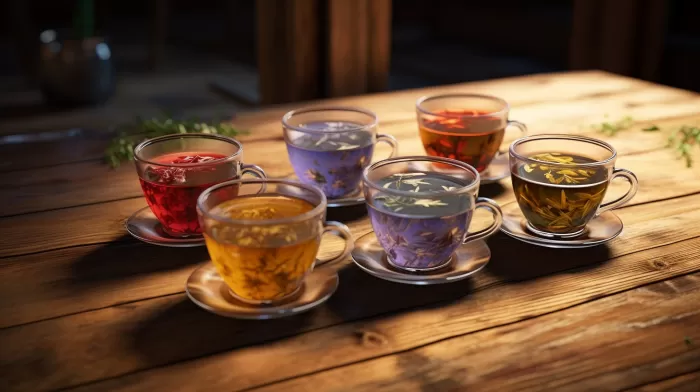Green tea has long been touted as a miracle health drink, offering benefits ranging from weight loss to cancer prevention. However, recent studies have uncovered the dangers of consuming too much green tea, especially in supplement form.
With concerns about liver toxicity on the rise, many health-conscious individuals are seeking out alternatives that offer similar benefits without the risks. In this article, we’ll explore some of the healthiest options available.
1. Herbal Teas
Herbal teas are a fantastic choice for those looking to switch up their tea routine. These caffeine-free options come in a wide variety of flavors and offer unique health benefits.
Some top contenders include:
a. Chamomile Tea: Known for its calming properties, chamomile tea can help reduce anxiety, promote better sleep, and even aid in digestion.
b. Peppermint Tea: This refreshing tea is a natural remedy for upset stomachs, bloating, and nausea. It can also improve focus and memory.
c. Hibiscus Tea: Rich in antioxidants, hibiscus tea may help lower blood pressure, reduce inflammation, and support weight management.
2. White Tea
White tea is minimally processed and harvested while the tea plant buds are still young. This results in a delicate flavor and a higher concentration of antioxidants compared to other teas.
Studies suggest that white tea may protect against heart disease, combat aging, and even have anti-cancer properties. Plus, it contains less caffeine than green tea, making it a good choice for those sensitive to stimulants.
3. Rooibos Tea
Rooibos, or “red bush” tea, is a South African herb that brews into a reddish-brown infusion. Naturally caffeine-free, rooibos is packed with antioxidants and has been linked to improved heart health, reduced inflammation, and better blood sugar control.
It’s also a good source of calcium, manganese, and fluoride, which support strong bones and teeth.
4. Matcha
While matcha is a type of green tea, it’s grown and processed differently than traditional green tea leaves. The plants are shade-grown and ground into a fine powder, resulting in a higher concentration of beneficial compounds.
Matcha is rich in catechins, which are potent antioxidants that may boost metabolism, reduce stress, and protect against chronic diseases. However, it’s important to consume matcha in moderation and choose high-quality, organic varieties to minimize the risk of contaminants.
5. Water
While not technically a tea, water is hands-down the healthiest beverage you can drink. Staying properly hydrated is essential for every aspect of health, from digestion and nutrient absorption to skin health and cognitive function.
Aim to drink at least 8 glasses of water per day, and more if you’re active or live in a hot climate. If plain water isn’t appealing, try infusing it with fresh fruit or herbs for a naturally flavored drink.
6. Mushroom Teas
Mushroom teas are gaining popularity for their unique health properties. Chaga, reishi, and lion’s mane mushrooms are among the most commonly used varieties.
These functional fungi are rich in compounds called beta-glucans, which have been shown to stimulate the immune system, reduce inflammation, and even have anti-tumor effects. Mushroom teas have an earthy, slightly bitter flavor and can be enjoyed on their own or blended with other teas for a milder taste.
7. Kombucha
Kombucha is a fermented tea beverage that’s rich in probiotics, beneficial bacteria that support gut health. It’s typically made from black or green tea, sugar, and a symbiotic culture of bacteria and yeast (SCOBY).
The fermentation process produces acetic acid, which gives kombucha its characteristic tart flavor and may help improve digestion, boost immunity, and even aid in weight loss. However, kombucha does contain some caffeine and sugar, so it’s best consumed in moderation as part of a balanced diet.
While green tea certainly has its merits, it’s not the only healthy beverage out there. By expanding your tea horizons and incorporating some of these alternatives into your routine, you can reap a wide range of health benefits without putting your liver at risk.
Remember, moderation is key with any food or drink, so be sure to consume these teas as part of a varied, balanced diet. And as always, if you have any underlying health conditions or concerns, it’s best to consult with your healthcare provider before making significant changes to your diet or lifestyle.
